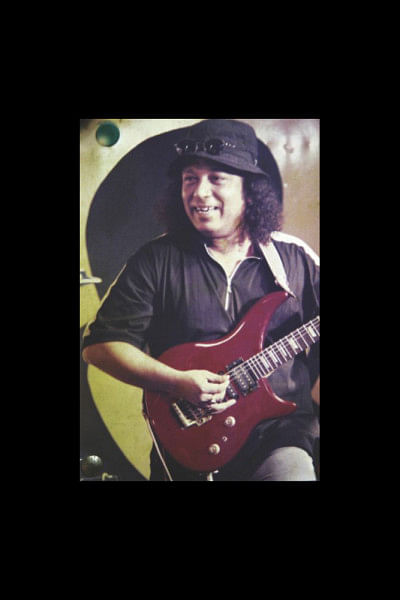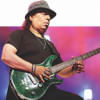Adieu, AB

AB is no more. The nation is in his debt, and there's nothing we can do about it. There are murmured demands for some sort of a national tribute or recognition. If you ask me, a man, who has won over hearts, has no use for medals.
On October 18, 2018, there was shocked disbelief in the morning air. Slowly, the tributes began flowing in. The prime minister and the president expressed their condolences. Social media was in flux. Thousands reminisced their unique relationship with this revered musician, with many posting photographs, autographs, album covers and song links. Messages poured in from outside Bangladesh too. As I write today, his music is emanating from every other screen, apartment, store and vehicle. The nation is paying its tribute.
Of course, fudging the limits of decency and civility during emotionally-charged times is our albatross around the neck. Sensational tidbits like his last moments or similar details seem to be in high demand. AB's family has had to issue a plea to stem the sharing of post-death photos. I don't deny that AB the artist is a towering public figure and thereby belongs to all Bangladeshis—but let us not forget that AB the man belongs to his family and loved ones.
***
Ayub Bachchu (AB) debuted on the Chittagong "band music" scene in 1978, at the age of 15. Remember, back in those days, the category of "band music" was viewed with a lot of malice and suspicion. Most households didn't look too kindly upon indoor jams and practice sessions. Most conservative parents didn't approve of the wild-haired, reckless and permissive culture that this music supposedly represented. Band music—in this view—didn't conform to prevalent lyrical etiquette, musical traditions, percussive beats or gender norms. An abomination, if you will. To many, it represented free-mixing, western clothes, smoking, drugs, and nonconformance in general.
It was into this rock musician's nightmare that AB was thrust. One can only imagine what mettle it takes to start out as a fairly skilled guitarist, and to then mature into a boundary-pushing, genre-shaping, much-loved national icon. I wouldn't be exaggerating to say that AB, along with contemporary musicians, led a mini renaissance-of-sorts back in the 80s, enabling rock music to reestablish its footing in the mainstream. But the impact of a musician of his stature is still more far-reaching.
Coming of age, globalisation, urban isolation, infatuation, unrequited love, pop culture, patriotism, death and departure have all featured prominently in songs sung by AB. Bachchu's music embodied a sweet balance of boldness and the uniquely Bangali vulnerability known as obhiman. There are thousands of overly sentimental Bangali men, myself included, who have found—in Ayub Bachchu and LRB's songs—words to embody their feelings. Hopeless romantics and infatuated youth have found meaning in their suffering, and discovered in themselves the tenacity to persevere on their amorous pursuits.
In a culture where men are raised to suppress their feelings, providing avenues for expressing passion and desire is no ordinary feat. In multiple instances, Bachchu openly discussed his personal life, starting from reminiscing about his departed mother, to sharing his dreams for his children. For him, Bangali sentimentality wasn't necessarily something to be ashamed of. And for this reason, through his songs and his persona, AB managed to help his listeners find the courage to acknowledge, and speak openly about their own feelings. He inspired entire generations to be comfortable in their own skin. And all this while maintaining an immaculate public persona in the eyes of his millions of fans.
It is true that AB started off his career singing English numbers, adopting western musical styles and dress codes. But one can't help suspecting that Bachchu himself was a true product of the Bangali middle-class. Behind the shades, the leather and the bling, he adored his mother, worried about his family, loved to show off his children's achievements, and never forgot where he had come from.
***
Those close to him often describe Bachchu as a hardworking professional. Music was his profession, and his great love. Early on, he learnt to play guitar without the help of readymade lessons and tablature. Remember this was in the 70s, when you didn't have product reviews, online stores or proper technicians. Against all odds, AB developed his own brand of licks and solos, and is responsible for some of the best riffs in contemporary Bangla music.
Bachchu tirelessly did live performances, while balancing time for his prolific studio albums. He was also dipping a toe in cinema playback, with all instances finding popular acclaim. Like a true artist, he dedicated himself to celebrating love, to critiquing society, to regarding human frailty, and last but not the least, to uplifting his craft and profession. He was a prolific artist, but he was never wealthy. He was reportedly a generous soul, but never forgot that music was as much his profession as it was his passion.
On the side, he was a leading figure in organising professional musicians and advocating for industry issues like anti-piracy regulations. AB was also a source of appreciation, mentorship and patronage to a host of aspiring musicians, in and out of his studio AB Kitchen. He was always gracious to the thousands of boys with guitars who wanted to emulate him. It is largely thanks to giants like Ayub Bachchu that young women or men can today freely dream of becoming career musicians.
***
Like those of all versatile artists, Bachchu's fans remain divided when it comes to deciding on his best creation. There are those who argue that his early work was much more socially-conscious and meaningful compared to his later musical choices. Others counter that that's only because we're comparing Bachchu to himself. Otherwise, he is unparalleled.
Some say Bachchu, while a technical genius, truly mastered "feel" in his guitar-playing during his later years. Then there are those who agree with and vigorously defend his foray into folksy pop tunes—the same ones that drew the most number of dancers during concerts. Others bring up the natural trajectory of an artist's career, evolving with the times, evolving with changing social realities. In that sense, artists like AB who radiate the dreams and aspirations of generation after generation, slowly become part of the zeitgeist.
Let us mourn AB's loss, and let us pay attention to what AB sang, what he valued and what he represented. I understand the prevalent sentiment, "He had so much more to give!" While that is entirely plausible, what he has given us (28 studio albums to begin with) is staggering. Let us consider this huge body of work, and realise that "band music" has come of age, and truly deserves institutional patronage and policy support. Oh! And… no piracy please!
Adnan R Amin is a strategy and communications consultant.










Comments